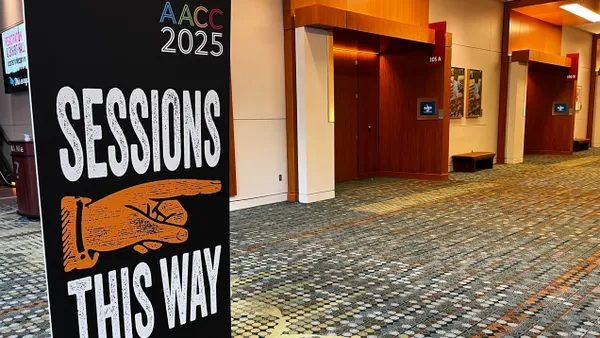This summer, we're digging into our archives for stories on current trends, challenges and opportunities in higher ed. This is our seventh installment. Read the first, second, third, fourth, fifth and sixth posts.
Short of a full degree and often with a much narrower focus, microcredentials are increasingly finding a place in college curriculum. Called everything from "badges" to "certificates," they are used to give current students a new way to show what they've learned and to offer seasoned professionals the opportunity to keep their skills fresh.
For instance, students at colleges in the Washington, D.C., metro area can earn a credential proving they have mastered certain technology skills, improving their chances of landing internships and job interviews with local employers. And at Oakwood University in Huntsville, Alabama, student workers can earn badges for skills they pick up in their campus jobs.
A push in Congress to allow more short-term programs to qualify for federal financial aid could spur further interest in mircrocredentials. However, research indicates data on such programs is not widely gathered and that the programs vary widely in length, focus, enrollment and outcomes.
The following articles show how colleges are incorporating new kinds of credentials into their curriculum as well as some of the potential challenges in doing so.
What's in a microcredential?
Colleges looking to issue microcredentials can start by repackaging what they're already teaching, experts say. That may be simpler for hard-and-fast technology skills like coding than for abstract abilities like teamwork. But finding a way to do so will be important. "In the next decade, colleges will compete for students at a competency level, not a degree level," said Kathleen deLaski, founder and president of Education Design Lab, a Washington, D.C.-based nonprofit that helps colleges offer microcredentials. Read more.
With badges, colleges take a hard look at teaching soft skills
As employers demand that hires excel in areas such as critical thinking and communication, colleges are looking for ways to show that their students have those abilities. "Jobs are changing and the change is more than technological," said Katie Lynch-Holmes, principal strategic consultant at Ellucian. "Yes, technology is driving or forcing that change, but the requirements (of employees) are more and more human." Read more.
How can higher ed bring transparency to the alternative credential marketplace?
Enthusiasm for these kinds of credentials is undercut by a lack of information about their quality and, as a result, their limited transferability outside the region in which they are offered. "We need to think beyond local borders because we're not going to address this issue and really unlock mobility for folks if we remain so fragmented in the way we think about credentials," said Danielle Goonan, senior manager at the Walmart Foundation. Read more.














